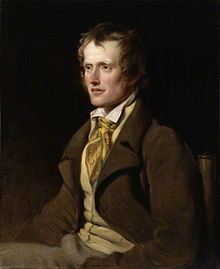Last week when I was reading about Lucia Joyce the daughter of James Joyce, I found out that she spent decades in St Andrews Mental Hospital in Northampton. This was also the institution where the poet John Clare died in 1864 aged 70. It reminded me that today July 13th is his birthday, so I thought that I ought to say a few words about him even though I am not an expert by any means. John Clare was born in a small cottage in the village of Helpston near my hometown of Peterborough in 1793. He left school at age 12 to become an agricultural labourer. Because of malnutrition as a child, he only grew to be five feet tall and suffered from poor health all his life. He fell in love with a girl called Mary Joyce who was the daughter of a wealthy farmer but was forbidden to see her because of his poverty. This disappointment had a profound effect on his mental health in later life.
His book of poems called Poems Descriptive of Rural Life and Scenery was published in 1820 by John Taylor who also published Keats. It was an immediate success, as was his second collection called Village Minstrel and Other Poems. He married a milkmaid called Patty Turner and they had seven children. His success was short lived however and his third book The Shepherds Calendar sold poorly. His mental health declined, and he was admitted to an asylum in Essex. He walked 80 miles home from there. One of his delusions was that he had two wives, one of whom was Mary Joyce. He was finally admitted to the asylum in Northampton where he stayed for about 23 years until his death. It was during this time that some critics say he wrote some of his finest poetry.
 |
| John Clare's Cottage. |
He was almost forgotten by the end of the 19th century, but in recent decades he has come to be regarded as a major poet. John Clare had a much greater knowledge of wildlife than other famous nature poets such as Wordsworth. For instance, in his poetry he mentions 147 species of wild British birds. He was ahead of his time in seeing the negative effects of the industrial revolution on the countryside where pastures were ploughed up, trees and hedges uprooted, fens drained and common land enclosed. With his love of the natural world there must be a place for John Clare in this age of climate change and destruction of forests and natural habits for animals.
As well as being a great poet John Clare also wrote some very moving prose. In a book called Rare Mankind by Geoffrey Grigson I found this nice piece by John Clare describing the day in London when he happened upon Lord Byron's funeral. I scanned the pages of the book.













